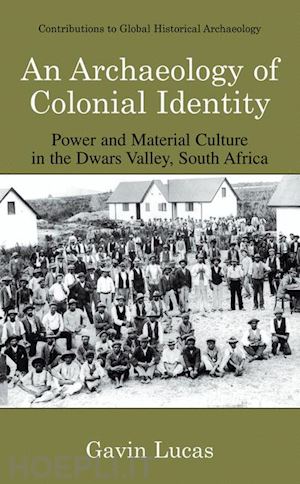This book examines how colonial identities were constructed in the Cape Colony of South Africa since its establishment in the 17th century up to the 20th century. It is an explicitly archaeological approach but which also draws more widely on documentary material to examine how different people in the colony - from settler to slave - constructed identities through material culture. The book explores three key groups: The Dutch East India Company, the free settlers and the slaves, through a number of archaeological sites and contexts. With the archaeological evidence, the book examines how these different groups were enmeshed within racial, sexual, and class ideologies in the broader context of capitalism and colonialism, and draws extensively on current social theory, in particular post-colonialism, feminism and Marxism. This book is aimed primarily at archaeologists, but will also attract historians and those interested in cultural theory and material culture studies. Specifically, historical archaeologists and students of historical archaeology will be the primary readership and buyers. TOC:Working Contexts.- Introduction: Global Networks.- From Cambridge to Capetown: The Politics and Production of Knowledge.- Narrative Genres: The Textual and Visual Archive.- The Archaeology of Dutch Capitalism and the Colonial Trade.- The New Republic and the Dutch east India Company.- The Cape Colony, 1652-1975 - Goede Verwachting: The Silver Mine on the Simonsbert.- Landscapes of Labour.- The Role of Silver in the Indian Ocean Trade.- Status and Settlement in the Cape Colony.- The Settlement of the Southwestern Cape, 1657-1795.- De Goede Hoop: Anatomy of a Settler Farm, 1688-1897.- Consumption, Material Culture and Social Differentiation at the Cape in the 18th and 19th Centuries - Farm Lives.- Slavery at the Cape, 1652-1834.- From Madagascar to the Dwars Valley: The World of Slaves.- Landscapes of Slavery.- Emancipation and the Pniel Mission Station.- Architecture and the Articulation of Post-Emancipation Identities.- From Emancipation to Apartheid: Pniel and the Dwars Valley in the 20th Century.- ERF 776: The Anatomy of a House Lot.- Apartheid and Identity.- Forging Identities.- Race, Class and Gender.- Questions of Identity and Culture.- The Nature of Colonial Space and the Development of Capitalism in the Indian Ocean.- Colonial Identity and Material Culture in the Metropole.- References - Index.











